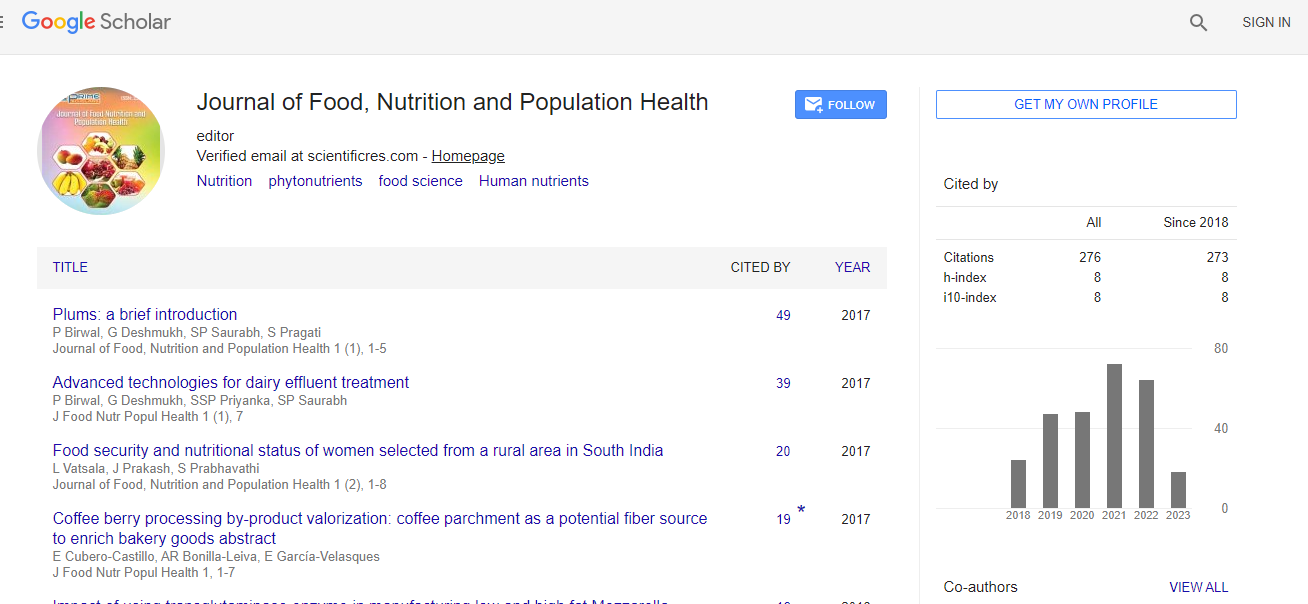Perspective - (2023) Volume 7, Issue 2
Following a Low-Carb Diet May Alter Your Resting Metabolic Rate
Leandra Koetsier*
Department of Food Science, Henan University, China
*Correspondence:
Leandra Koetsier,
Department of Food Science, Henan University,
China,
Email:
Received: 30-May-2023, Manuscript No. ipjfnph-23-16806;
Editor assigned: 01-Jun-2023, Pre QC No. ipjfnph-23-16806 (PQ);
Reviewed: 15-Jun-2023, QC No. ipjfnph-23-16806;
Revised: 20-Jun-2023, Manuscript No. ipjfnph-23-16806 (R);
Published:
27-Jun-2023, DOI: 10.21767/2577-0586.7.02.15
Introduction
Obesity, now a serious medical condition, affects 400 million
adults worldwide. Weight is also an important general health
condition in Iran, where 21.7% of the adult population is obese.
Body weight has been described as a persistent multifactorial
problem with a genetic presupposition caused by the accumulation
of excess adipose tissue. Insulin disorders, hypertension,
progression of dyslipidemia, diabetes mellitus; in many countries,
a propensity to eat high-fat and high-energy food sources
is among the major factors contributing to the increased incidence
of obesity. And low actual work. Conventional obesity
treatment has combined a low-calorie diet with improved actual
work and health education. Part of the deal is to recommend
the most sensible diet for each person in light of their eating
habits, needs, and examples. Low-fat diets and low-calorie
weight loss are usually encouraged to lose weight with fewer
calories. But a low-carbohydrate diet (low-carb diet) is also a
popular decision. With the ultimate goal of solving the problem
of obesity and increased adipose tissue, the current review
should address the mediating role of low-carbohydrate diets
and their proportion to body weight. Overweight and obesity
rates have increased rapidly in recent years. One way he controls
his weight is by increasing his RMR. Regardless, low-carbohydrate
diets may hinder obesity improvement. Previous studies
have shown an association between low-carbohydrate diets
and obesity. Consequently, this study sought to test the effect
of LCDS on the possible relationship between body weight and
deviation from normal RMR in overweight and obese women.
Description
Findings from an ongoing review show that higher adherence
to a low-carbohydrate diet is associated with higher LDL-c. This
finding was predictive on the basis of previous evidence that
fat intake causes increases in LDL-c. Based on previous studies,
we know that the lower the dietary sugar intake, the more clusters of HDL-c. Another finding of this study is that increased
RMR is positively associated with increased RMR per kg body
weight, skeletal volume, fragile lean body mass, and ISQUICKI.
These findings were consistent with previous findings that
showed that fat mass was associated with increased metabolic
rate in women with muscle-to-fat ratios up to 40%. Excess fat
mass affects your metabolic capacity. Nevertheless, in obese
and obese individuals, fat mass is directly affected by altering
substrate oxidation and metabolic rates, as well as by constant
hormonal centers, of which skeletal muscle is the well-regulated
supporter of RMR. Implicitly by changes, there are more
pronounced metabolic effects. Lean body mass, which includes
both organ tissue and skeletal muscle, accounts for 60%-70%
and 20%-30% of RMR, respectively. Although mass is clearly
the primary site of substrate oxidation and has been associated
with improved health status, such as improved insulin and
glucose excursions, the relationship between body composition
(particularly metabolic capacity) and lean body mass is still
unclear.
Conclusion
No significant relationship was found between LCDS and RMR
status in this study. This finding is consistent with previous research
showing that low-carbohydrate calories are neglected
to increase energy expenditure, as opposed to low-fat weight
management plans. We investigated the association between
portions of a low-carbohydrate diet and DNR. After varying
age, actual work, FFM, and energy expenditure, significant relationships
were found between sugar, MUFA, refined grains,
and DNR from one perspective. Previous studies have also suggested
that dietary sugar is one of the variables remembered
to influence metabolic fluctuationvs. Nonetheless, ongoing
findings suggest that dietary starch reduction may reduce RMR
reduction through systems related to substrate accessibility
and autonomic and hormonal action.
Citation: Koetsier L (2023) Following a Low-carb Diet may Alter your Resting Metabolic Rate. J Food Nutr Popul Health. 7:15.
Copyright: © 2023 Koetsier L. This is an open-access article distributed under the terms of the Creative Commons Attribution License, which permits unrestricted use, distribution, and reproduction in any medium, provided the original author and source are credited

